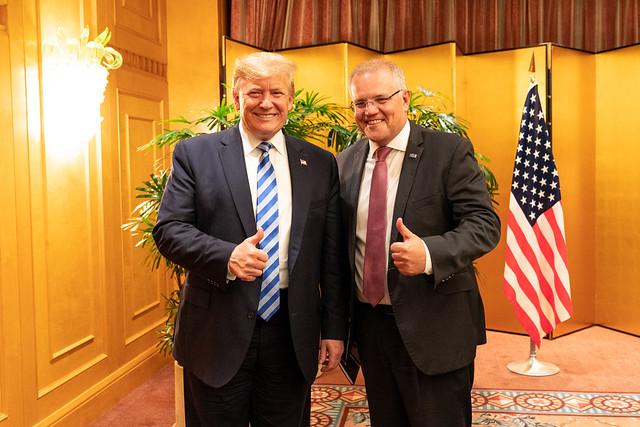
The world
Australian student Alek Sigley is reported to have been detained in North Korea. The news came just hours before Prime Minister Scott Morrison sat down with US President Donald Trump in Japan. It’s thought that Sigley may be being held ahead of the US president’s visit to South Korea and a possible third summit between Trump and Kim Jong-un. See the Financial Review for how Sigley’s detention could be used as a bargaining chip in negotiations with Pyongyang.
The prime minister is in Japan for the G20, which is underway in Osaka. Morrison’s meeting with Trump focused on alliances and trade and was one of a number of bilateral meetings he’s holding with other leaders at the summit—though Chinese President Xi Jinping isn’t one of them. See the Japan Times for why the outcomes of the one-on-one meetings are likely to be much more significant than whatever the G20 leaders manage to jointly agree to.
The Lowy Institute has released its annual international policy poll, which highlights how Australians view the changes in the global security landscape over the past year. Some stand-out findings include climate change ranking as number one on the threat index and the Australian public’s trust in China and the US both hitting their lowest points since the poll’s inception in 2005. A major source of this distrust could lie in the US–China trade war. Don’t cash in your savings just yet, though, as the Financial Review claims the impact on Australia will be minimal, trimming only around 0.07 percentage points off GDP growth over the next two years.
Following the recent developments between the US and Iran, this brief history looks at relations between the countries since 1953. (Spoiler alert: it hasn’t been smooth sailing.) See this analysis of recent Iranian actions in the Persian Gulf and whether they signal the beginnings of open conflict. Speaking of which, Iran isn’t backing down from a potential confrontation, with Supreme Leader Ali Khamenei remaining defiant in the face of US sanctions and rising tensions between the countries. For a glimpse into Iran’s sophisticated offensive cyber capabilities, visit the Center for Strategic and International Studies, and see how Iraq will react to the building pressure from both Iran and the US in Foreign Affairs.
And if you’re wondering how a potential clash between the US and Iran fits into a global geopolitical view, see the New York Times for how the situation in the Persian Gulf is actually all about China. Robert D. Kaplan leans heavily on Halford Mackinder’s ‘world island’ theory, but China’s presence in Pakistan and the focus of the Belt and Road Initiative add weight to his argument. Kelly Magsamen from the Center for American Progress was a bit more succinct, tweeting: ‘If we go to war with Iran, we lose this century to the Chinese. It’s actually that simple. The stakes are that high.’
For some extra reading, see this interesting long read in ProPublica on what really happened in the 2016 incident involving the capture of 10 US Navy sailors by the Iranian Islamic Revolutionary Guard Corps.
Tech geek
It’s been a long time coming, but the US is finally developing a successor to the AIM-120 missile. The ‘AIM-260’ Joint Air Tactical Missile is being rolled out in response to rapid development of increasingly long-range Chinese and Russian air-to-air missiles.
There’s an interesting article in The Strategy Bridge on why geography and geopolitics still matter, even in the era of cyberwarfare. After all, cyberspace still depends on infrastructure, which is based in the physical world and affected by geography.
A key concern for the US Navy in the Persian Gulf is swarm raids against its ships by Iranian fast attack craft. In response, it’s set to undertake a study of how to defend against such an attack. There’s some interesting analysis (and here) on Iranian swarm boat attacks, as well as a report on Iran’s growing ability to challenge US naval power in the Gulf.
What does religion have to do with nuclear weapons? According to Dmitry Adamsky, there’s a clear link between the Russian Orthodox Church and the country’s nuclear capability. See here for a review of Adamsky’s book, Russian nuclear orthodoxy: religion, politics and strategy.
A recent dynamic in military affairs has been the growing influence of science fiction—particularly military science fiction—in thinking about future warfare. The Central Blue is keenly aware of this and their collection is worth browsing through.
This week in history
This week in 1950, North Korean soldiers crossed the 38th Parallel and invaded South Korea, sparking the Korean War. There were 339 Australians killed among the estimated 2.5 million people who lost their lives between 1950 and 1953. Sometimes dubbed ‘the forgotten war’, it’s worth remembering that it still isn’t over.
Multimedia
A must-watch! The Atlantic has released a short documentary that follows the process taken by Russia to turn an Estonian army officer into a double agent [15:29]. For more on the story, see this long read.
Al Jazeera brings you the story of Sarajevo’s librarians and how they saved thousands of books and manuscripts from destruction when the city was under siege. [46:35]
Podcasts
ASPI brings you the first of three special episodes of Policy, Guns and Money that focus on our international conference, ‘War in 2025’, which was held this month. [15:36]
Listen here for CSIS’s analysis of the difficulties associated with recent developments on the Korean peninsula, including the future of US–North Korea relations. [25:38]
Events
Canberra, 2 July, 5.30–7.30 pm, Australian Strategic Policy Institute: ‘Publication launch: Protecting critical national infrastructure in an era of IT and OT convergence’. Register here.
Sydney, 3 July, 6–7.30 pm, University of Sydney: ‘Sydney ideas: Can we make food security failsafe in the age of climate change?’ Register here.